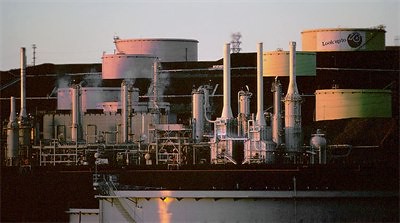Interesting article on the CNOOC bid for Unocal

Yes, yes, Unocal is now merging with Chevron-Texaco; yes, this decision was taken despite [one of] China's national oil companies, CNOOC, making a bid of $19 billion for the company, and being underbid by Chevron-Texaco. So it's not really important news and we can forget about it now, right? Well, no; in fact, it's probably more useful to think about this development now that we're "out of the woods," meaning, of course, that we are obsolved of worrying about the dilemma of stepping in to prevent China from buying an American oil company. This dilemma, incidentally, is outlined here quite well:
WILLIAM A. REINSCH, an avowed free trader, welcomes China's rising stature in the international economy. After all, he is the president of the National Foreign Trade Council, an organization founded in 1914 to promote an "open world trading system." Indeed, when he was a senior trade official in the Clinton administration, Mr. Reinsch was chided by some security analysts who said he was being soft on China by placing matters of commerce ahead of national security.I hate it when people use the term "enemy" in reference to any country; the last time we were in a declared war with another country, mules were a vital part of military logistics, and "total war" was not a synonym for "suicide." Since then, I've always wanted to think of that war as one against fascism, not Germany, Japan, Hungary, and Italy. Hearing people refer to China as an "enemy" is a sure-fire way to get my back up. For one thing, it's not falsifiable: there's no way in which China can avoid being an enemy, except by lacking the political and military strength one would be oblidged to expect from a booming nation of 1.3 billion human beings. Animosity implies grievance; it makes me uneasy, because China has far more legitimate grounds for grievance against us, than vice-versa.
But even Mr. Reinsch is uneasy about China's attempt to buy Unocal, a midsize American oil company. The outcome of the takeover contest for Unocal is uncertain, and last week its board embraced an improved offer from Chevron. Yet Cnooc, a government-backed Chinese oil company, still has the higher offer - and it could up the ante.If the Chinese bid proceeds, Mr. Reinsch wants to see a thorough national security review of the deal, one that goes beyond the usual focus on weapons technology to include energy security. "Our Army, Navy and Air Force run on oil," he explained.
Oil is the ultimate geopolitical commodity - it is "The Prize," as Daniel Yergin titled his epic history of petroleum and international politics. And even if Cnooc fails to grab Unocal, the pursuit has pushed the two sides of the Chinese challenge together and into the spotlight of public debate. For China is both an engine of economic globalization and an emerging military power. In symbolic shorthand, it is Wal-Mart with an army.
Look, capital markets need to be managed. The top corporations are claiming or demanding protection as national assets, except when they want the bidding from a foreign company; but when it's time to discuss drilling in ANWR (or if a member of congress calls for tariffs) then suddenly they're strategic and it's not prudential to let the market apply to them. Folks, corporations want it both ways: they want to be covered as vital national assets and engines of job creation (& therefore entitled to tax give-aways and subsidies); but they also insist on being allowed to dispose of the public interest in ways that are entirely self-serving. This is an contradiction and we cannot live with it. This is off topic, but it's so urgent it has to be discussed.
Labels: economics


